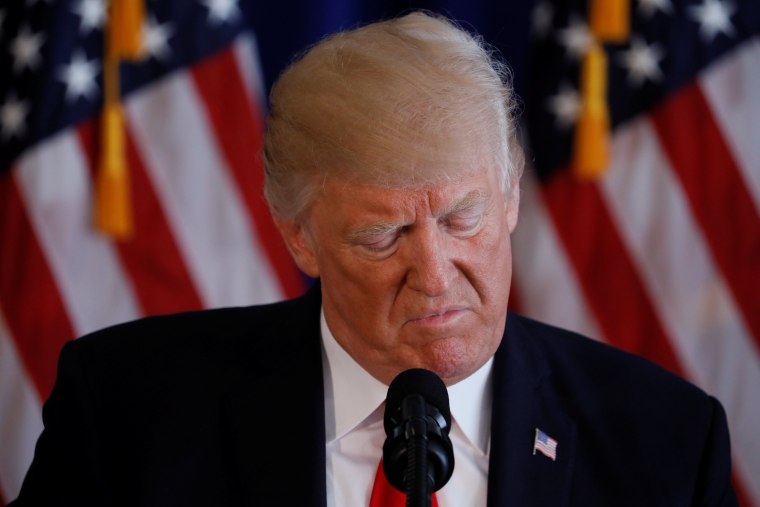The American presidency, Franklin Roosevelt once said, is "preeminently a place of moral leadership." It helps explain why Donald Trump is failing so spectacularly: the current occupant of the Oval Office has no real interest in providing moral leadership, or even learning how.
The president was already scheduled to speak on Saturday afternoon -- his remarks were supposed to focus on veterans' issues -- and interest in his remarks grew in the wake of the deadly violence that erupted in Charlottesville, Virginia. This was a unique opportunity for Trump to speak out clearly and forcefully against a societal scourge.
But instead of being the president America needed, Donald Trump was Donald Trump
"We condemn in the strongest possible terms this egregious display of hatred, bigotry and violence -- on many sides, on many sides."
After referencing low unemployment and other economic developments he's eager to take credit for, the president added, "We must love each other, respect each other, and cherish our history." Trump then transitioned back to his original remarks, explaining how pleased he with a new law that makes it easier for him to fire people who work at the Department of Veterans Affairs.
The president made no specific reference to the white supremacists responsible for Saturday's violence. Trump, preferring to remain maddeningly vague, could've condemned neo-Nazis, white nationalists, and terrorists -- when someone deliberately uses a car as a weapon, driving into a crowd, no other word is appropriate -- but he chose not to.
Instead, Trump turned his attention to hatred, bigotry, and violence "on many sides," as if white supremacists and their opponents are equally culpable for the unrest in Charlottesville.
In the face of bipartisan rebukes, the White House eventually condemned white supremacists in a written statement, but it was not only too late, it was also attributed to an unnamed White House official -- not the president. The attempt at damage control did little to stem the tide of public revulsion. On the contrary, phrases such as "cherish our history" were seen as possible dog-whistle comments, intended to pander to the same people he should've been denouncing.
Faced with yet another test of presidential leadership, Trump flunked -- again.
Indeed, let no one say Trump's depravity was out of character. His response to last year's attack in Orlando -- the deadliest mass shooting in U.S. history -- was pathetic. His reaction to the attack in Nice, France, was every bit as foolish. The Republican president's response to recent terrorism in London quickly became an international embarrassment.
The common denominator, of course, is that Donald J. Trump is useless to a cringe-worthy degree in times of crisis, but Saturday's developments added another dimension to the problem. The president, faced with a seemingly easy opportunity to do and say the right thing, shrunk. Confronted with Nazis on American soil causing deadly violence, Trump was the one thing he swears he is not: weak.
So many controversies surrounding this White House are tied together by allegations of corruption, but this was a case of Trump demonstrating moral corruption, calling into question not just what the president did, but who he is.
The question the White House and its allies will struggle with is why Trump failed this specific test so badly. What is it, exactly, about racists that led the president to take the coward's way out? Shouldn't an American president condemning Nazis be one of the easiest of all possible denunciations?
A New York Times report summarized the landscape well: "President Trump is rarely reluctant to express his opinion, but he is often seized by caution when addressing the violence and vitriol of white nationalists, neo-Nazis and alt-right activists, some of whom are his supporters."
And that's a terrifying thought: a sitting president pulling his punches, afraid to offend dangerous domestic radicals, perhaps because he sees them as part of his political base.
Whether Trump knows or cares is unclear, but part of being president is speaking to and for the nation in the wake of a tragedy. Much of the country was sickened by what they saw in Charlottesville, and Trump could've used his platform to appeal to Americans' best instincts, delivering a unifying message, and making clear that there is no place in modern American life for white supremacists or their failed, twisted ideology.
Trump chose a different path. It won't soon be forgotten.
